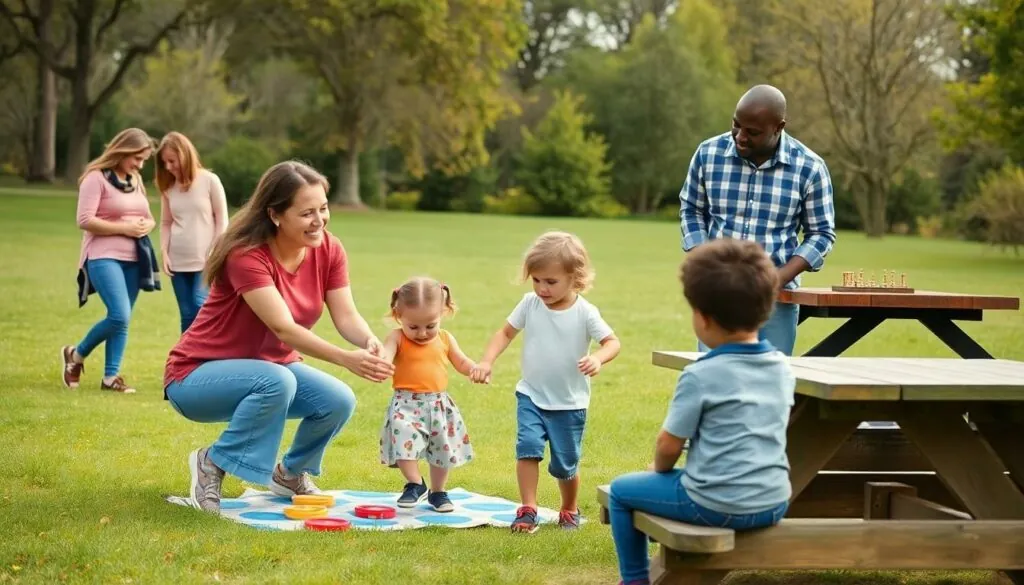Table of Contents
ToggleParenting styles can feel like a game of chess, with each move shaping a child’s future. But let’s face it—sometimes it’s more like a game of Twister where one wrong twist can lead to a family feud. With so many theories and opinions swirling around, it’s easy to get tangled up in what’s true and what’s just another parenting myth.
Whether it’s the authoritative approach that promises to raise a confident leader or the permissive style that sounds like a free-for-all, deciphering these statements can be a challenge. So, which of these parenting styles actually holds water? Join the quest for the truth, and discover the secrets behind effective parenting styles that won’t leave you spinning in circles.
Overview Of Parenting Styles
Parenting styles significantly impact child development and behavior. Four primary approaches define how parents interact with their children: authoritative, authoritarian, permissive, and neglectful. Each style reflects varying levels of responsiveness and demandingness.
Authoritative parents balance demand and support. They set clear expectations while remaining open to dialogue. This balance nurtures independence and self-regulation in children. Research shows that children raised in authoritative homes often display higher academic performance and social competence.
Authoritarian parents impose strict rules with little room for flexibility. They value obedience and often use disciplinary measures. Children in these environments may obey rules but often struggle with self-esteem and social skills due to the lack of emotional support.
Permissive parents adopt a lenient approach, offering few guidelines. They prioritize emotional connection over discipline. While children may feel loved and accepted, they sometimes revert to behavioral issues due to a lack of structure and boundaries.
Neglectful parents exhibit little involvement, either emotionally or physically. They provide basic needs but fail to offer guidance or nurturing. Children from neglectful backgrounds often experience a range of difficulties, including emotional and behavioral problems.
Understanding these parenting styles contributes to identifying effective methods for raising children. Recognizing how each style affects a child’s growth can help parents make informed decisions. Adjusting one’s approach can improve the parent-child dynamic and foster healthier development.
Authoritative Parenting Style
Authoritative parenting blends high expectations with emotional support. This approach emphasizes guiding children rather than imposing rules.
Characteristics
Characteristics of authoritative parenting include clear communication, warmth, and reasonable expectations. Parents actively engage in discussions, allowing children to express themselves. Boundaries remain firmly in place while still encouraging independence. They promote self-regulation and problem-solving skills. Additionally, authoritative parents adapt their strategies as children grow, ensuring continued development and understanding.
Benefits
Benefits of authoritative parenting are numerous. Children raised with this style demonstrate better academic performance and social skills. They often exhibit higher self-esteem and lower levels of anxiety. Furthermore, these children tend to build healthier relationships with peers and authority figures. Equipped with effective coping mechanisms, they navigate challenges more successfully. Overall, the authoritative approach fosters resilience, encouraging kids to become responsible, well-rounded adults.
Authoritarian Parenting Style
Authoritarian parenting emphasizes strict rules and absolute control. This style often lacks emotional warmth and open communication, creating a rigid environment for children.
Characteristics
Authoritarian parents maintain high expectations of obedience. They enforce rules without room for discussion, often relying on punishments instead of reasoning. Structure and discipline form the foundation of their approach. Children receive little feedback on their feelings or thoughts. This lack of emotional engagement can hinder a child’s ability to express themselves. Notably, authoritarian parents often prioritize compliance over independence.
Effects On Children
Children raised in authoritarian households often struggle with self-esteem. Many face difficulties in social interactions due to a limited understanding of emotional cues. Research indicates that these children may exhibit increased anxiety and depression levels. Furthermore, rigid rules can stifle creativity and problem-solving skills. Emotional resilience often suffers, resulting in a lack of coping mechanisms in challenging situations. In many cases, these children may rebel against authority, leading to conflicts in adolescence.
Permissive Parenting Style
Permissive parenting focuses on emotional connection while providing limited structure and discipline. This approach fosters a warm, nurturing environment but can lead to challenges in behavior management.
Characteristics
Permissive parents exhibit high levels of warmth and affection. They often avoid setting strict rules or boundaries, allowing children significant freedom in their choices. Communication is open, encouraging children to express their feelings and opinions. This parenting style responds to children’s needs and desires but can lack consistent enforcement of consequences. A notable characteristic is the tendency to prioritize friendship over authority, which can blur the lines in parent-child dynamics.
Advantages And Disadvantages
Permissive parenting offers several advantages, including strong emotional bonds and open communication. Children may develop creativity and self-expression as they explore their interests freely. However, disadvantages arise due to insufficient structure. Kids raised in permissive households can struggle with impulse control and authority acceptance. Behavioral problems may emerge as a consequence of unclear expectations. Without limits, children might not learn essential skills for managing disappointment or frustration, leading to difficulties in social settings.
Uninvolved Parenting Style
Uninvolved parenting, also known as neglectful parenting, features minimal engagement from parents. This style often stems from a lack of awareness or resources to provide appropriate guidance and emotional support.
Characteristics
Neglectful parents typically display low levels of responsiveness and demandingness. Children receive little attention or feedback regarding their behavior and needs. Such parents may prioritize their own interests, leading to emotional detachment. As a result, children often feel ignored, increasing their reliance on peers for support. Uninvolved parents often lack consistent rules or guidance, causing children to navigate life independently without sufficient structure. This absence of involvement may manifest as apathy, leaving children without the necessary tools to understand boundaries.
Long-Term Impact
Children raised in uninvolved environments experience several adverse effects. Academic performance may decline due to a lack of support and encouragement. These children often struggle with self-esteem issues, stemming from feelings of unworthiness. Social interactions can also suffer, as they may develop poor coping mechanisms and exhibit difficulties in forming relationships. Emotional problems frequently arise, leading to increased risks of anxiety and depression. Research indicates that these individuals may face challenges in adulthood, including difficulties in maintaining healthy relationships and managing responsibilities.
Comparison Of Parenting Styles
Parenting styles can significantly influence a child’s development. Authoritative parents, known for their balance of expectations and support, promote independence and self-regulation. Characteristics include clear communication, warmth, and reasonable expectations. This approach often leads to children with better academic performance and self-esteem.
In contrast, authoritarian parents maintain strict rules and expect absolute compliance. These parents lack emotional warmth, which can stifle a child’s ability to express themselves. Children in such environments may experience struggles with social interactions and heightened anxiety levels.
Permissive parenting focuses on emotional connections but often fails to provide necessary structure. While these parents foster strong emotional bonds, their approach can lead to behavioral issues. Children raised by permissive parents might struggle with impulse control and acceptance of authority due to inconsistent expectations.
Neglectful, or uninvolved, parenting presents a different challenge altogether. Minimal engagement characterizes this style, often resulting from a lack of resources or awareness. These parents show low responsiveness and demandingness, leaving children feeling ignored. The consequences can include poor academic performance and difficulties in forming healthy relationships.
Understanding these varying parenting styles allows for informed decisions that enhance parent-child dynamics. Each style’s characteristics directly impact children’s behavior and emotional health. Awareness of these differences equips parents to adopt effective strategies that foster healthy development.
Conclusion
Navigating the world of parenting styles can feel overwhelming but understanding their nuances is essential. Each style has its unique impact on children’s development and emotional well-being. By recognizing the traits of authoritative, authoritarian, permissive, and neglectful parenting, individuals can make more informed choices in their parenting journey. Emphasizing warmth and communication while maintaining reasonable expectations can lead to healthier outcomes for children. Ultimately, the goal is to create a nurturing environment that fosters resilience and growth, empowering children to thrive in all aspects of life.








